人教版九年级Unit 12 Life is full of the unexpected现在完成时&过去完成时语法讲练(共50张PPT)
文档属性
| 名称 | 人教版九年级Unit 12 Life is full of the unexpected现在完成时&过去完成时语法讲练(共50张PPT) |  | |
| 格式 | pptx | ||
| 文件大小 | 411.5KB | ||
| 资源类型 | 教案 | ||
| 版本资源 | 人教新目标(Go for it)版 | ||
| 科目 | 英语 | ||
| 更新时间 | 2021-02-11 13:31:25 | ||
图片预览

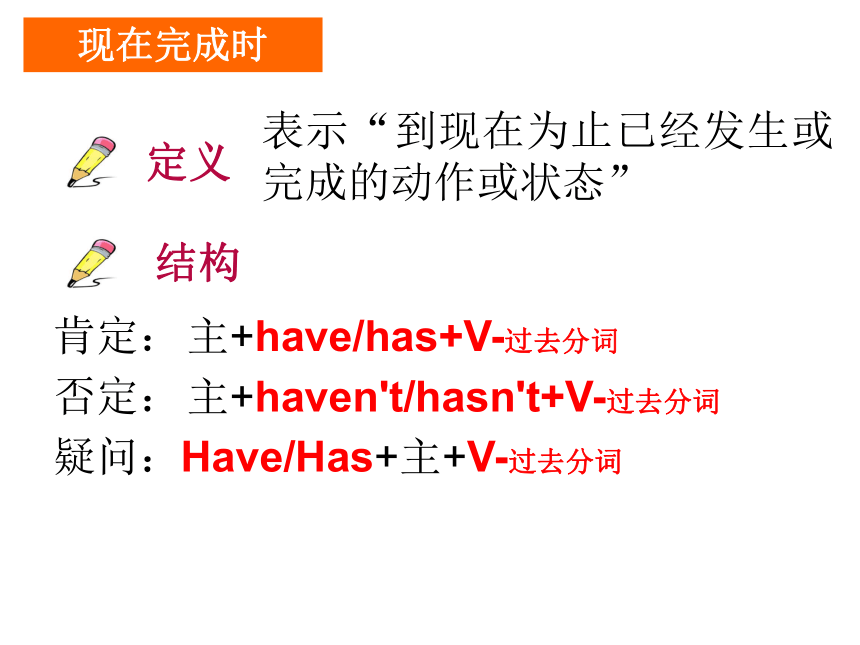
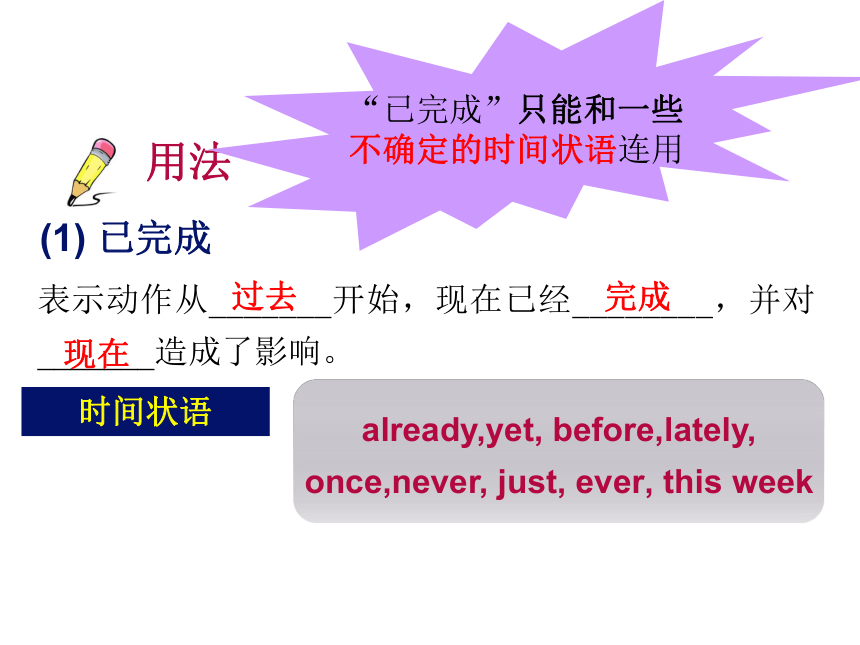
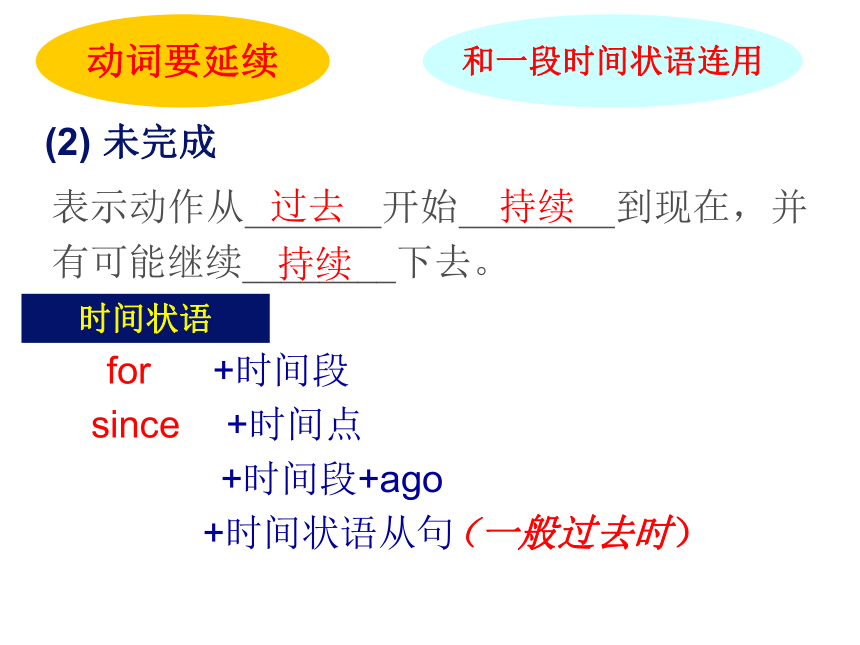
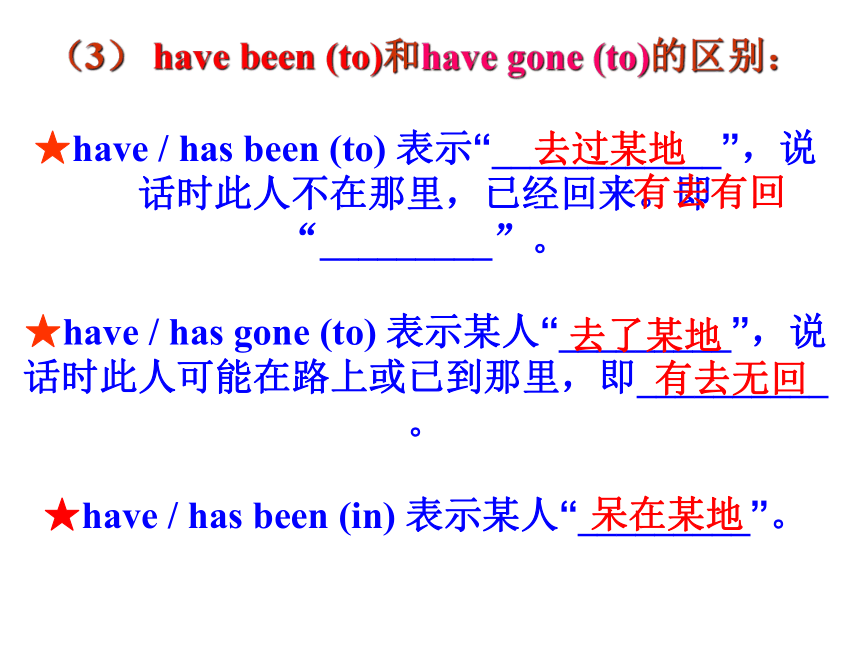
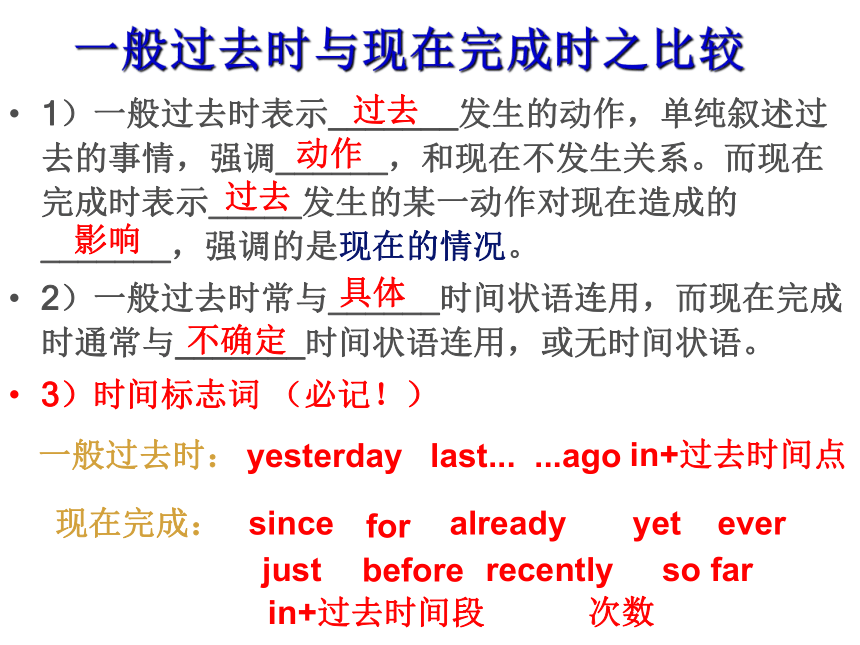
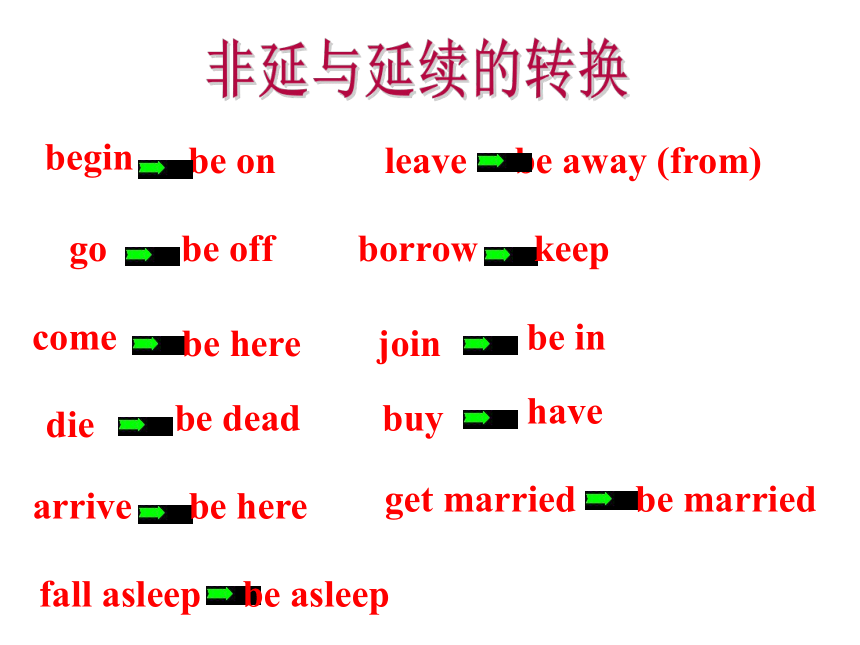
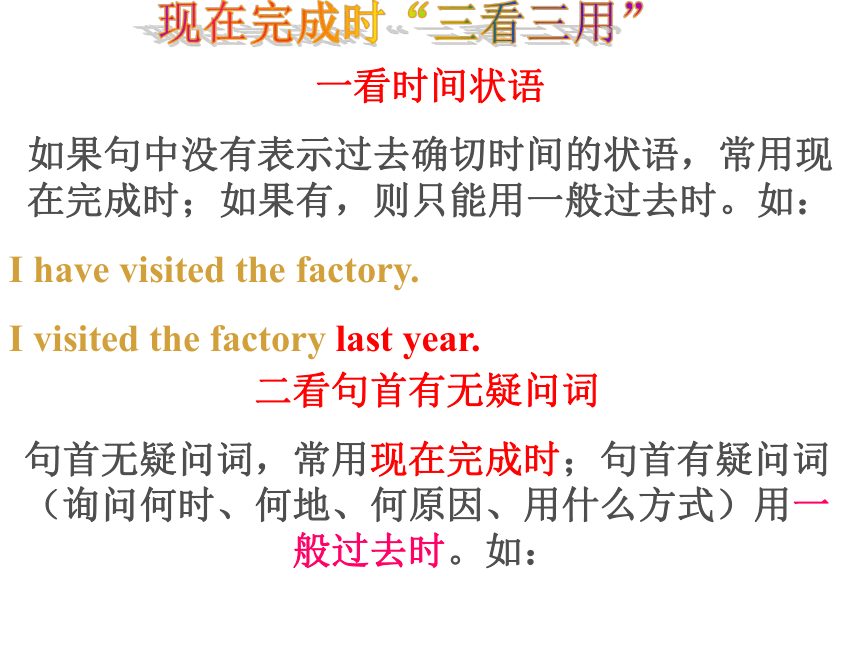
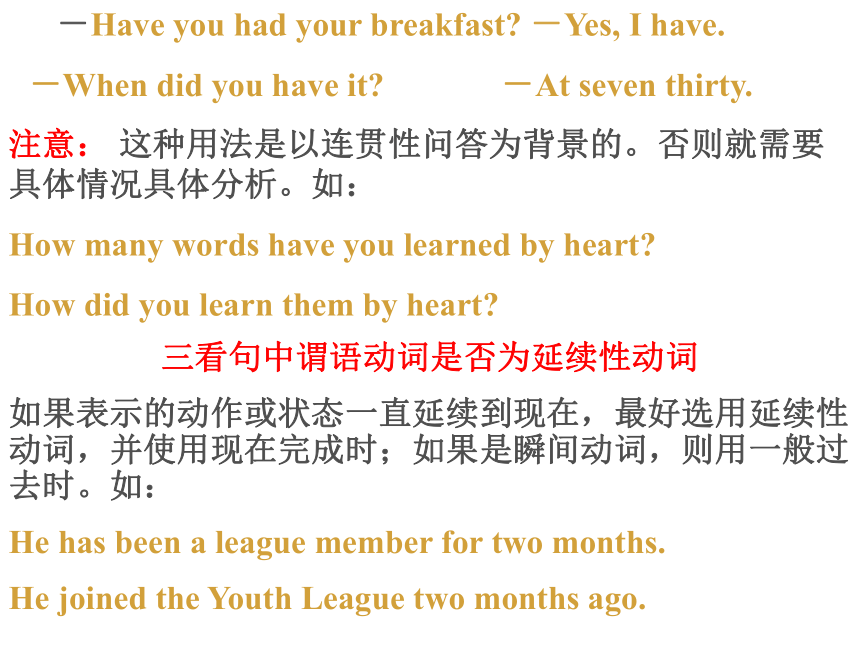

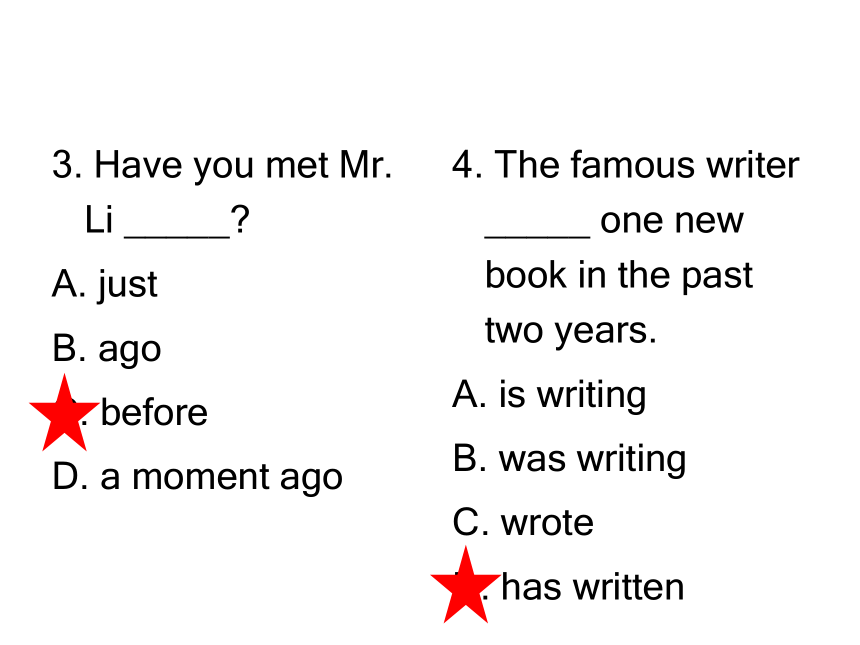
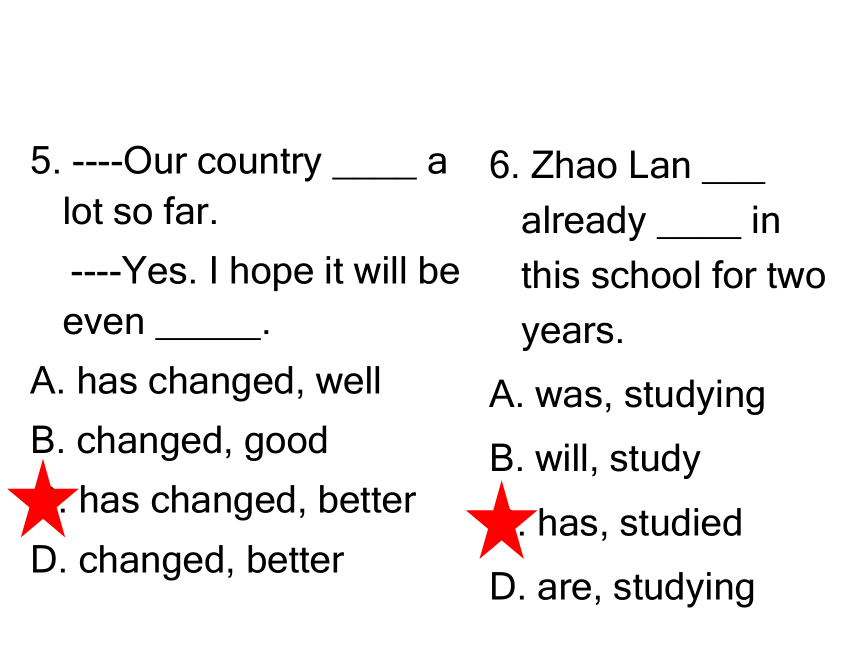
文档简介
(共50张PPT)
现在完成时
&
过去完成时
现在完成时
定义
表示“到现在为止已经发生或完成的动作或状态”
结构
肯定:
主+have/has+V-过去分词
否定:
疑问:
主+haven't/hasn't+V-过去分词
Have/Has+主+V-过去分词
用法
表示动作从_______开始,现在已经________,并对_______造成了影响。
(1) 已完成
过去
完成
现在
时间状语
already,yet, before,lately,
once,never, just, ever, this week
“已完成”只能和一些
不确定的时间状语连用
表示动作从_______开始________到现在,并有可能继续________下去。
过去
持续
持续
for
+时间段
since
+时间点
+时间段+ago
+时间状语从句
(一般过去时)
(2) 未完成
动词要延续
和一段时间状语连用
时间状语
(3) have been (to)和have gone (to)的区别:
★have / has been (to) 表示“____________”,说话时此人不在那里,已经回来。即“_________”。
★have / has gone (to) 表示某人“_________”,说话时此人可能在路上或已到那里,即__________。
★have / has been (in) 表示某人“_________”。
去过某地
有去有回
去了某地
有去无回
呆在某地
一般过去时与现在完成时之比较
1)一般过去时表示_______发生的动作,单纯叙述过去的事情,强调______,和现在不发生关系。而现在完成时表示_____发生的某一动作对现在造成的_______,强调的是现在的情况。
2)一般过去时常与______时间状语连用,而现在完成时通常与_______时间状语连用,或无时间状语。
3)时间标志词 (必记!)
过去
动作
过去
影响
具体
不确定
一般过去时:
yesterday
last...
...ago
现在完成:
since
for
already
yet
ever
just
before
in+过去时间点
recently
so far
in+过去时间段
次数
be on
leave
go
be away (from)
非延与延续的转换
begin
be off
borrow
keep
come
be here
join
be in
die
be dead
buy
have
arrive
be here
get married
be married
fall asleep
be asleep
现在完成时“三看三用”
一看时间状语
如果句中没有表示过去确切时间的状语,常用现在完成时;如果有,则只能用一般过去时。如:
I have visited the factory.
I visited the factory last year.
二看句首有无疑问词
句首无疑问词,常用现在完成时;句首有疑问词(询问何时、何地、何原因、用什么方式)用一般过去时。如:
-Have you had your breakfast -Yes, I have.
-When did you have it -At seven thirty.
三看句中谓语动词是否为延续性动词
如果表示的动作或状态一直延续到现在,最好选用延续性动词,并使用现在完成时;如果是瞬间动词,则用一般过去时。如:
He has been a league member for two months.
He joined the Youth League two months ago.
注意: 这种用法是以连贯性问答为背景的。否则就需要具体情况具体分析。如:
How many words have you learned by heart
How did you learn them by heart
单项选择
1. Both his parents look sad. May be they ____ what's happened to him.
A. knew
B. have known
C. must know
D. will know
2. He has ____ been to Shanghai, has he
A. already
B. never
C. ever
D. still
3. Have you met Mr. Li _____
A. just
B. ago
C. before
D. a moment ago
4. The famous writer _____ one new book in the past two years.
A. is writing
B. was writing
C. wrote
D. has written
5. ----Our country ____ a lot so far.
----Yes. I hope it will be even _____.
A. has changed, well
B. changed, good
C. has changed, better
D. changed, better
6. Zhao Lan ___ already ____ in this school for two years.
A. was, studying
B. will, study
C. has, studied
D. are, studying
7. We ____ Xiao Li since she was a little girl.
A. know
B. had known
C. have known
D. knew
8. Harry Potter is a very nice film. I _____ it twice.
A. will see
B. have seen
C. saw
D. see
9. ----These farmers have been to the United States.
----Really When ____ there
A. will they go
B. did they go
C. do they go
D. have they gone
10. My parents ____ Shangdong for ten years.
A. have been in
B. have been to
C. have gone to
D. have been
11. ____ has Mr. White been a member of Greener China since he ____ to China
A. How soon, comes
B. How often, got
C. How long, came
D. How far, arrived
12. His uncle ____ for more than 9 years.
A. has come here
B. has started to work
C. has lived there
D. has left the university
13. Hurry up! The play ____ for ten minutes.
A. has begun
B. had begun
C. has been on
D. began
14. His father ____ the Party since 1978.
A. joined
B. has joined
C. was in
D. has been in
句型转换
1. They have been there since 2000. (对划线部分提问)
How long have they been there
2. This factory opened twenty years ago. (同义句)
This factory has been open for twenty years.
3. Miss Gao left an hour ago. (同义句)
The bus has been here since ten minutes ago.
4. The bus has arrived here. It arrived ten minutes ago. (合并成一句)
The bus has been here for ten minutes.
Miss Gao has been away for an hour.
翻译
1. 他昨天收到一封信。
He received a letter yesterday.
2. 我父亲以前到过长城。
My father has been to the Great Wall before.
3. 他这些天上哪儿去了?
I have worked in this city since I left school.
4. 她还没看过那部新电影。
She hasn't seen the new film yet.
Where has he been these days
5. 自从我离开学校,我一直在这个城市工作。
拓展
我在这里已经住了20年了。
现在完成进行时
have/has
been doing
表示动作从过去开始一直持续到现在,并有可能继续持续下去。
过去
现在
I have been living here for 20 years.
一、过去完成时的概念与结构特点:
概念:过去完成时表示在过去某一时间或动作之前已经发生或完成了的动作,即“过去的过去”。
构成:过去完成时由“助动词 had + 过去分词”构成,其中 had 通用于各种人称。
肯定/否定句:主语+had / hadn’t +过去分词+…
一般疑问句:Had +主语+过去分词…?
(Yes, 主语+had. / No, 主语+hadn’t.)
特殊疑问句:疑问词+had +主语+过去分词+…?
过去完成时
用法
含有when/before/after/until引导的时间状语从句
(1) 用于两个先后发生的动作
The train had left before I reached the station.
如果两个动作紧接着发生,则常常都用一般过去时,
特别是含有before/after的复合句
The train left before I reached the station.
(2) 用于told, said, knew, heard, thought等后的宾语从句,从句的动作发生在主句之前。
He said that he had met her before.
我还了我借的那本书。
(3) 含有定语从句的句子,如果叙述的是过去,先发生的用过去完成时。
I returned the book
that I had borrowed.
二、过去完成时的判断依据:
1. 由时间状语来判定:表示动作从过去持续到过去一段时间。与过去完成时连用的时间状语有:
(1) by + 过去的时间点。如:
昨天晚上九点前我已经读完这本小说了。
I had finished reading the novel by nine o'clock last night.
(2) by the end of + 过去的时间点。如:
截止到上学期末,我们已经学了两千多个英文单词了。
We had learned over two thousand English words by the end of last term.
(3) before + 过去的时间点。如:
上周三以前他们已经中了六百棵树了。
They had planted six hundred trees before last Wednesday.
2. 由“过去的过去”来判定:过去完成时表示“过去的过去”,是指过去某一动作之前已经发生或完成的动作,即动作有先后关系,动作在前的用过去完成时,在后的用一般过去时。这种用法常出现在:
(1) 宾语从句中: 当宾语从句的主句为一般过去时,且从句的动作先于主句的动作时,从句要用过去完成时。在told, said, knew, heard, thought等动词后的宾语从句。如:
她说她以前看过这电影。She said that she had seen the film before.
(2) 状语从句中: 在时间、条件、原因、方式等状语从句中,主、从句的动作发生有先后关系,动作在前的,要用过去完成时,动作在后的要用一般过去时。如:
当我到达车站时,火车已经离开了。When I got to the station, the train had already left.
他完成作业以后,就上床睡觉了。After he had finished his homework, he went to bed.
注意:before, after 引导的时间状语从句中,由于 before 和 after 本身已表达了动作的先后关系,若主、从句表示的动作紧密相连,则主、从句都用一般过去时。如:
你来这儿之前在哪儿学习?Where did you study (had you studied) before you came here
他关上门,离开了教室。After he closed the door, he left the classroom.
三、过去完成时与现在完成时的区别
1.现在完成时表示的动作发生在过去,但侧重对现在产生的结果或造成的影响,其结构为“助动词 have (has) + 过去分词”;过去完成时则是一个相对的时态,它所表示的动作不仅发生在过去,更强调“过去的过去”,只有和过去某时或某动作相比较时,才用到它。试比较
— What’s wrong with the door
— Some children have broken it.
— John returned home yesterday.
— Where had he been
(使用过去完成时是指约翰在 returned home 之前去了哪些地方,即“过去的过去”)
2.现在完成时强调一个动作从过去到现在并可能持续到将来;过去完成时强调一个动作从过去持续到过去并可能继续。
到目前为止我已经学会了 1000 个英语单词。
I have already learned 1000 English words so far.
到那时为止我已经学会了 1000 个英语单词。
I had already learned 1000 English words till then.
注意 过去完成跟现在完成时共通的地方是他们都可以与already,yet,since,for连用。
观察:Where is Lily I have waited for her for an hour!
When Jack arrived, Mary had been away for almost an hour.
注意
英语中,已经有了一个过去一般时表示在过去发生的动作,为什么还有过去完成时呢?
要记住:过去完成时的关键概念是:假设在过去发生了两件(或以上)的事件,一件是A事件,另一件是B事件,如果A、B两个事件几乎是同时发生的,那就用一般过去时;但是,如果A、B两个事件不是同时发生的,怎么办呢?那就是:哪个事件先发生,就用过去完成时;哪个事件后发生,就用过去时。在上面的假设中,如果A事件先发生,A就用过去完成时;如果B事件先发生,B就用过去完成时;而不管两件事是用什么样的时间状语或其它形式表示的。
五、过去完成时与一般过去时的区别
1. 时间状语不同:过去完成时在时间上强调“过去的过去”;而一般过去时只强调过去某一特定的时间。试比较:
他们昨天十点前就到车站了。
They had arrived at the station by ten yesterday.
他们昨天十点到了车站。
They arrived at the station at ten yesterday.
2. 在没有明确的过去时间状语作标志时,谓语动词动作发生的时间先后须依据上下文来判断:先发生的用过去完成时,后发生的则用一般过去时。如:
She was very happy. Her whole family were pleased with her, too. She had just won the first in the composition competition.
3. 当两个或两个以上接连发生的动作用 and 或 but 连接时,按时间顺序,只需用一般过去时来代替过去完成时;另外,在 before, after, as soon as引导的从句中,由于这些连词本身已经表示出时间的先后,若主、从句表示的动作紧密相连,则主、从句都用一般过去时。如:
他进入房间,打开灯,看晚报。
He entered the room, turned on the light and read an evening paper.
我离开办公室前给她打了电话。
I (had) called her before I left the office.
过去完成时使用时,必须有或含有一个发生在过去的动作与其比较,即有“先发生”和“后发生”。“先发生”用过去完成时,“后发生”用一般过去时。
总结
单项选择
1. He asked me ____ during the summer holidays.
A. where I had been
B. where I had gone
C. where had I been
D. where had I gone
2. What ___ Jane ____ by the time she was seven.
A. did, do
B. has, done
C. did, did
D. had, done
3. I ____ 900 English words by the time I was ten.
A. learned
B. was learning
C. had learned
D. learned
4. By the time my parents reached home yesterday, I ____ the dinner already.
A. had cooked
B. cooked
C. have cooked
D. was cooking
5. She said she ____ the principle already.
A. has seen
B. saw
C. will see
D. had seen
6. She had written a number of books ____ the end of last year.
A. for
B. in
C. by
D. at
7. He ___ in the factory for three years before he joined the Army.
A. has worked
B. works
C. had worked
D. will work
8. The students ____ their classroom when the visitors arrived.
A. have cleaned
B. had cleaned
C. was cleaned
D. have been cleaned
9. The man ____ his coat and went out.
A. put on
B. had put on
C. will put on
D. was putting on
10. My mother ____ in that factory at the age of 18.
A. had worked
B. has worked
C. worked
D. works
1.He asked me _____ during the summer holidays.
A. where I had been B. where I had gone
C. where had I been D. where had I gone
2. What ____ Jane ____ by the time he was sever
A. did, do B. has, done C did, did. D. had, done
3. I ______ 900 English words by the time I was ten.
A. learned B. was learning
C. had learned D. learnt
A
D
C
4. She ______lived here for ______ years.
A. had, a few B. has, several
C. had, a lot of D. has, a great deal of
5. By the time my parents reached home yesterday, I _____ the dinner already.
A had cooked B. cooked
C. have cooked D. was cooked
B
A
1.When I _______ (arrive) at the station, he _____(leave).
2.We _____ (learn) about 4000 English words by the end of last term.
3. I waited until he ______ (finish) his homework.
4. We were surprised at what she ____already _____(do)
5.She ______(not go) to Qingdao because she ______(go) there before.
arrived
had left
had learned
(had) finished
had
done
didn't go
had been
6. He ______ (not tell) you the news yet.
7. He said he ________already______(give) the book to the teacher.
8. I _______ (be) to Shanghai before.
9. She told me she _____(be) to Sanya three times.
hasn't told
had
given
have been
had been
1)当我到达学校的时候,我才意识到我把书包忘在家里了。
_______ I got to school, I realized that I
______ ______ my backpack at home.
2)到我返回学校的时候,铃声已经响过了。
_____ _____ _____ I got back to school, the bell ______ _______.
When
had
left
By the time
had rung
根据汉语提示完成句子。
3) 我到达公共汽车站之前, 汽车已经离开了。
Before I _____ _____ the bus stop, the
bus ______ _______ _______.
4) 我决定先买一杯咖啡,然后再去办公室。
I ______ ______ ______ go up to my office when I decided to get a coffee first.
got to
had
already left
was about to
5) 就在我和别的工作人员一起排队等候 的时候,听到了一个巨大的声响。
As I ______ _______ ______ ______ with the other office workers, I
______ _____ _____ ______.
was waiting in line
heard a loud sound
4b
Fill in the blanks with the correct forms of the words in the box.
1. By the time I arrived at the party, everyone else _____ already __________.
2. When he put the noodles into a bowl, he realized he ____________ to add the green beans (n. 豆).
rush out, forget, arrive at, go into,
show up (赶到;露面), find out
shown up
had
had forgotten
3. By the time my mother came back from the market (n. 市场), I ______ already __________ of the door to go to my piano lesson.
4. Before she got to the airport, she ____________ about the earthquake.
had
rushed out
had found out
rush out, forget, arrive at, go into,
show up (赶到;露面), find out
5. When she _________ the movie theater, she remembered she had forgotten to feed her dog.
6. Before she got a chance to say goodbye, he ____________ the building.
arrived at
had gone into
rush out, forget, arrive at, go into,
show up (赶到;露面), find out
Thank You
现在完成时
&
过去完成时
现在完成时
定义
表示“到现在为止已经发生或完成的动作或状态”
结构
肯定:
主+have/has+V-过去分词
否定:
疑问:
主+haven't/hasn't+V-过去分词
Have/Has+主+V-过去分词
用法
表示动作从_______开始,现在已经________,并对_______造成了影响。
(1) 已完成
过去
完成
现在
时间状语
already,yet, before,lately,
once,never, just, ever, this week
“已完成”只能和一些
不确定的时间状语连用
表示动作从_______开始________到现在,并有可能继续________下去。
过去
持续
持续
for
+时间段
since
+时间点
+时间段+ago
+时间状语从句
(一般过去时)
(2) 未完成
动词要延续
和一段时间状语连用
时间状语
(3) have been (to)和have gone (to)的区别:
★have / has been (to) 表示“____________”,说话时此人不在那里,已经回来。即“_________”。
★have / has gone (to) 表示某人“_________”,说话时此人可能在路上或已到那里,即__________。
★have / has been (in) 表示某人“_________”。
去过某地
有去有回
去了某地
有去无回
呆在某地
一般过去时与现在完成时之比较
1)一般过去时表示_______发生的动作,单纯叙述过去的事情,强调______,和现在不发生关系。而现在完成时表示_____发生的某一动作对现在造成的_______,强调的是现在的情况。
2)一般过去时常与______时间状语连用,而现在完成时通常与_______时间状语连用,或无时间状语。
3)时间标志词 (必记!)
过去
动作
过去
影响
具体
不确定
一般过去时:
yesterday
last...
...ago
现在完成:
since
for
already
yet
ever
just
before
in+过去时间点
recently
so far
in+过去时间段
次数
be on
leave
go
be away (from)
非延与延续的转换
begin
be off
borrow
keep
come
be here
join
be in
die
be dead
buy
have
arrive
be here
get married
be married
fall asleep
be asleep
现在完成时“三看三用”
一看时间状语
如果句中没有表示过去确切时间的状语,常用现在完成时;如果有,则只能用一般过去时。如:
I have visited the factory.
I visited the factory last year.
二看句首有无疑问词
句首无疑问词,常用现在完成时;句首有疑问词(询问何时、何地、何原因、用什么方式)用一般过去时。如:
-Have you had your breakfast -Yes, I have.
-When did you have it -At seven thirty.
三看句中谓语动词是否为延续性动词
如果表示的动作或状态一直延续到现在,最好选用延续性动词,并使用现在完成时;如果是瞬间动词,则用一般过去时。如:
He has been a league member for two months.
He joined the Youth League two months ago.
注意: 这种用法是以连贯性问答为背景的。否则就需要具体情况具体分析。如:
How many words have you learned by heart
How did you learn them by heart
单项选择
1. Both his parents look sad. May be they ____ what's happened to him.
A. knew
B. have known
C. must know
D. will know
2. He has ____ been to Shanghai, has he
A. already
B. never
C. ever
D. still
3. Have you met Mr. Li _____
A. just
B. ago
C. before
D. a moment ago
4. The famous writer _____ one new book in the past two years.
A. is writing
B. was writing
C. wrote
D. has written
5. ----Our country ____ a lot so far.
----Yes. I hope it will be even _____.
A. has changed, well
B. changed, good
C. has changed, better
D. changed, better
6. Zhao Lan ___ already ____ in this school for two years.
A. was, studying
B. will, study
C. has, studied
D. are, studying
7. We ____ Xiao Li since she was a little girl.
A. know
B. had known
C. have known
D. knew
8. Harry Potter is a very nice film. I _____ it twice.
A. will see
B. have seen
C. saw
D. see
9. ----These farmers have been to the United States.
----Really When ____ there
A. will they go
B. did they go
C. do they go
D. have they gone
10. My parents ____ Shangdong for ten years.
A. have been in
B. have been to
C. have gone to
D. have been
11. ____ has Mr. White been a member of Greener China since he ____ to China
A. How soon, comes
B. How often, got
C. How long, came
D. How far, arrived
12. His uncle ____ for more than 9 years.
A. has come here
B. has started to work
C. has lived there
D. has left the university
13. Hurry up! The play ____ for ten minutes.
A. has begun
B. had begun
C. has been on
D. began
14. His father ____ the Party since 1978.
A. joined
B. has joined
C. was in
D. has been in
句型转换
1. They have been there since 2000. (对划线部分提问)
How long have they been there
2. This factory opened twenty years ago. (同义句)
This factory has been open for twenty years.
3. Miss Gao left an hour ago. (同义句)
The bus has been here since ten minutes ago.
4. The bus has arrived here. It arrived ten minutes ago. (合并成一句)
The bus has been here for ten minutes.
Miss Gao has been away for an hour.
翻译
1. 他昨天收到一封信。
He received a letter yesterday.
2. 我父亲以前到过长城。
My father has been to the Great Wall before.
3. 他这些天上哪儿去了?
I have worked in this city since I left school.
4. 她还没看过那部新电影。
She hasn't seen the new film yet.
Where has he been these days
5. 自从我离开学校,我一直在这个城市工作。
拓展
我在这里已经住了20年了。
现在完成进行时
have/has
been doing
表示动作从过去开始一直持续到现在,并有可能继续持续下去。
过去
现在
I have been living here for 20 years.
一、过去完成时的概念与结构特点:
概念:过去完成时表示在过去某一时间或动作之前已经发生或完成了的动作,即“过去的过去”。
构成:过去完成时由“助动词 had + 过去分词”构成,其中 had 通用于各种人称。
肯定/否定句:主语+had / hadn’t +过去分词+…
一般疑问句:Had +主语+过去分词…?
(Yes, 主语+had. / No, 主语+hadn’t.)
特殊疑问句:疑问词+had +主语+过去分词+…?
过去完成时
用法
含有when/before/after/until引导的时间状语从句
(1) 用于两个先后发生的动作
The train had left before I reached the station.
如果两个动作紧接着发生,则常常都用一般过去时,
特别是含有before/after的复合句
The train left before I reached the station.
(2) 用于told, said, knew, heard, thought等后的宾语从句,从句的动作发生在主句之前。
He said that he had met her before.
我还了我借的那本书。
(3) 含有定语从句的句子,如果叙述的是过去,先发生的用过去完成时。
I returned the book
that I had borrowed.
二、过去完成时的判断依据:
1. 由时间状语来判定:表示动作从过去持续到过去一段时间。与过去完成时连用的时间状语有:
(1) by + 过去的时间点。如:
昨天晚上九点前我已经读完这本小说了。
I had finished reading the novel by nine o'clock last night.
(2) by the end of + 过去的时间点。如:
截止到上学期末,我们已经学了两千多个英文单词了。
We had learned over two thousand English words by the end of last term.
(3) before + 过去的时间点。如:
上周三以前他们已经中了六百棵树了。
They had planted six hundred trees before last Wednesday.
2. 由“过去的过去”来判定:过去完成时表示“过去的过去”,是指过去某一动作之前已经发生或完成的动作,即动作有先后关系,动作在前的用过去完成时,在后的用一般过去时。这种用法常出现在:
(1) 宾语从句中: 当宾语从句的主句为一般过去时,且从句的动作先于主句的动作时,从句要用过去完成时。在told, said, knew, heard, thought等动词后的宾语从句。如:
她说她以前看过这电影。She said that she had seen the film before.
(2) 状语从句中: 在时间、条件、原因、方式等状语从句中,主、从句的动作发生有先后关系,动作在前的,要用过去完成时,动作在后的要用一般过去时。如:
当我到达车站时,火车已经离开了。When I got to the station, the train had already left.
他完成作业以后,就上床睡觉了。After he had finished his homework, he went to bed.
注意:before, after 引导的时间状语从句中,由于 before 和 after 本身已表达了动作的先后关系,若主、从句表示的动作紧密相连,则主、从句都用一般过去时。如:
你来这儿之前在哪儿学习?Where did you study (had you studied) before you came here
他关上门,离开了教室。After he closed the door, he left the classroom.
三、过去完成时与现在完成时的区别
1.现在完成时表示的动作发生在过去,但侧重对现在产生的结果或造成的影响,其结构为“助动词 have (has) + 过去分词”;过去完成时则是一个相对的时态,它所表示的动作不仅发生在过去,更强调“过去的过去”,只有和过去某时或某动作相比较时,才用到它。试比较
— What’s wrong with the door
— Some children have broken it.
— John returned home yesterday.
— Where had he been
(使用过去完成时是指约翰在 returned home 之前去了哪些地方,即“过去的过去”)
2.现在完成时强调一个动作从过去到现在并可能持续到将来;过去完成时强调一个动作从过去持续到过去并可能继续。
到目前为止我已经学会了 1000 个英语单词。
I have already learned 1000 English words so far.
到那时为止我已经学会了 1000 个英语单词。
I had already learned 1000 English words till then.
注意 过去完成跟现在完成时共通的地方是他们都可以与already,yet,since,for连用。
观察:Where is Lily I have waited for her for an hour!
When Jack arrived, Mary had been away for almost an hour.
注意
英语中,已经有了一个过去一般时表示在过去发生的动作,为什么还有过去完成时呢?
要记住:过去完成时的关键概念是:假设在过去发生了两件(或以上)的事件,一件是A事件,另一件是B事件,如果A、B两个事件几乎是同时发生的,那就用一般过去时;但是,如果A、B两个事件不是同时发生的,怎么办呢?那就是:哪个事件先发生,就用过去完成时;哪个事件后发生,就用过去时。在上面的假设中,如果A事件先发生,A就用过去完成时;如果B事件先发生,B就用过去完成时;而不管两件事是用什么样的时间状语或其它形式表示的。
五、过去完成时与一般过去时的区别
1. 时间状语不同:过去完成时在时间上强调“过去的过去”;而一般过去时只强调过去某一特定的时间。试比较:
他们昨天十点前就到车站了。
They had arrived at the station by ten yesterday.
他们昨天十点到了车站。
They arrived at the station at ten yesterday.
2. 在没有明确的过去时间状语作标志时,谓语动词动作发生的时间先后须依据上下文来判断:先发生的用过去完成时,后发生的则用一般过去时。如:
She was very happy. Her whole family were pleased with her, too. She had just won the first in the composition competition.
3. 当两个或两个以上接连发生的动作用 and 或 but 连接时,按时间顺序,只需用一般过去时来代替过去完成时;另外,在 before, after, as soon as引导的从句中,由于这些连词本身已经表示出时间的先后,若主、从句表示的动作紧密相连,则主、从句都用一般过去时。如:
他进入房间,打开灯,看晚报。
He entered the room, turned on the light and read an evening paper.
我离开办公室前给她打了电话。
I (had) called her before I left the office.
过去完成时使用时,必须有或含有一个发生在过去的动作与其比较,即有“先发生”和“后发生”。“先发生”用过去完成时,“后发生”用一般过去时。
总结
单项选择
1. He asked me ____ during the summer holidays.
A. where I had been
B. where I had gone
C. where had I been
D. where had I gone
2. What ___ Jane ____ by the time she was seven.
A. did, do
B. has, done
C. did, did
D. had, done
3. I ____ 900 English words by the time I was ten.
A. learned
B. was learning
C. had learned
D. learned
4. By the time my parents reached home yesterday, I ____ the dinner already.
A. had cooked
B. cooked
C. have cooked
D. was cooking
5. She said she ____ the principle already.
A. has seen
B. saw
C. will see
D. had seen
6. She had written a number of books ____ the end of last year.
A. for
B. in
C. by
D. at
7. He ___ in the factory for three years before he joined the Army.
A. has worked
B. works
C. had worked
D. will work
8. The students ____ their classroom when the visitors arrived.
A. have cleaned
B. had cleaned
C. was cleaned
D. have been cleaned
9. The man ____ his coat and went out.
A. put on
B. had put on
C. will put on
D. was putting on
10. My mother ____ in that factory at the age of 18.
A. had worked
B. has worked
C. worked
D. works
1.He asked me _____ during the summer holidays.
A. where I had been B. where I had gone
C. where had I been D. where had I gone
2. What ____ Jane ____ by the time he was sever
A. did, do B. has, done C did, did. D. had, done
3. I ______ 900 English words by the time I was ten.
A. learned B. was learning
C. had learned D. learnt
A
D
C
4. She ______lived here for ______ years.
A. had, a few B. has, several
C. had, a lot of D. has, a great deal of
5. By the time my parents reached home yesterday, I _____ the dinner already.
A had cooked B. cooked
C. have cooked D. was cooked
B
A
1.When I _______ (arrive) at the station, he _____(leave).
2.We _____ (learn) about 4000 English words by the end of last term.
3. I waited until he ______ (finish) his homework.
4. We were surprised at what she ____already _____(do)
5.She ______(not go) to Qingdao because she ______(go) there before.
arrived
had left
had learned
(had) finished
had
done
didn't go
had been
6. He ______ (not tell) you the news yet.
7. He said he ________already______(give) the book to the teacher.
8. I _______ (be) to Shanghai before.
9. She told me she _____(be) to Sanya three times.
hasn't told
had
given
have been
had been
1)当我到达学校的时候,我才意识到我把书包忘在家里了。
_______ I got to school, I realized that I
______ ______ my backpack at home.
2)到我返回学校的时候,铃声已经响过了。
_____ _____ _____ I got back to school, the bell ______ _______.
When
had
left
By the time
had rung
根据汉语提示完成句子。
3) 我到达公共汽车站之前, 汽车已经离开了。
Before I _____ _____ the bus stop, the
bus ______ _______ _______.
4) 我决定先买一杯咖啡,然后再去办公室。
I ______ ______ ______ go up to my office when I decided to get a coffee first.
got to
had
already left
was about to
5) 就在我和别的工作人员一起排队等候 的时候,听到了一个巨大的声响。
As I ______ _______ ______ ______ with the other office workers, I
______ _____ _____ ______.
was waiting in line
heard a loud sound
4b
Fill in the blanks with the correct forms of the words in the box.
1. By the time I arrived at the party, everyone else _____ already __________.
2. When he put the noodles into a bowl, he realized he ____________ to add the green beans (n. 豆).
rush out, forget, arrive at, go into,
show up (赶到;露面), find out
shown up
had
had forgotten
3. By the time my mother came back from the market (n. 市场), I ______ already __________ of the door to go to my piano lesson.
4. Before she got to the airport, she ____________ about the earthquake.
had
rushed out
had found out
rush out, forget, arrive at, go into,
show up (赶到;露面), find out
5. When she _________ the movie theater, she remembered she had forgotten to feed her dog.
6. Before she got a chance to say goodbye, he ____________ the building.
arrived at
had gone into
rush out, forget, arrive at, go into,
show up (赶到;露面), find out
Thank You
同课章节目录
- Unit 1 How can we become good learners.
- Section A
- Section B
- Unit 2 I think that mooncakes are delicious!
- Section A
- Section B
- Unit 3 Could you please tell me where the restroom
- Section A
- Section B
- Unit 4 I used to be afraid of the dark.
- Section A
- Section B
- Unit 5 What are the shirts made of?
- Section A
- Section B
- Review of Units 1-5
- Unit 6 When was it invented?
- Section A
- Section B
- Unit 7 Teenagers should be allowed to choose their
- Section A
- Section B
- Unit 8 It must belong to Carla.
- Section A
- Section B
- Unit 9 I like music that I can dance to.
- Section A
- Section B
- Unit 10 You're supposed to shake hands.
- Section A
- Section B
- Review of Units 6-10
- Unit 11 Sad movies make me cry.
- Section A
- Section B
- Unit 12 Life is full of the unexpected
- Section A
- Section B
- Unit 13 We're trying to save the earth!
- Section A
- Section B
- Unit 14 I remember meeting all of you in Grade 7.
- Section A
- Section B
- Review of Units 11-14
